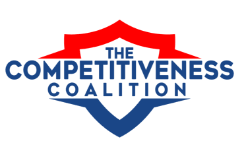EDITOR’S NOTE: On Monday, Dec. 4, Gov. Doug Burgum announced he was suspending his campaign.
Live from the Airport Diner in Manchester, NHJournal presents Diner Table Economics!
Want to hear the specific economic proposals from the people who want to be the next president of the United States? You’ll get it here, straight from the candidates themselves, over a cup of coffee at the iconic Airport Diner.
No “horserace politics,” no “politics of personality,” just a 25-minute conversation about jobs, inflation, taxes, and spending. The policy positions from regulation to tax reform that impact the daily lives of Granite Staters and all Americans.
In this edition, North Dakota Gov. Doug Burgum lays out his economic agenda. A few highlights:
Ending the Biden anti-fossil-fuel agenda on Day One:
“The first thing you have to do is actually let the [fossil-fuel] industry compete as opposed to try to choke it. Canceling the Keystone XL Pipeline with an executive order on the first day — I’m not even sure that’s legal. The president shouldn’t pick a private sector industry with a legal product moving through a legally permitted pipeline and say, ‘I don’t like that project, so I’m canceling it.’ Then let’s start picking other industries with things you don’t like, Joe Biden, and cancel it.”
“People in New Hampshire are burning heating oil, right? At the time of the Russian invasion [of Ukraine], there were 400,000 barrels of oil a day of dirty Russian heating oil being offloaded into New England. And in New England, 41 percent of the people still heat their homes with heating oil, the highest [rate] in the nation. Well, it’s because you can’t get a pipeline with clean U.S. natural gas from Pennsylvania to New England because New York won’t permit it. So all these pipelines like that, to me, that’s worth an executive order because that’s national security. We should be able to actually move our clean energy around our own country.”
Why government attempts to regulate technology are almost always a mistake:
“When the government says that they can regulate this stuff [AI], they can’t. Every time we’ve attempted to regulate technology, we’re so far behind. They come up with an idea [for a regulation], and they talk about it for two years. They go through some rule-making, and now you’re talking literally six or eight years. Meanwhile, Moore’s Law has kicked in like four or five times (Moore’s Law: computer chip performance roughly doubles every 18 months while the price drops).
“So just about any regulation they have is outdated by the time they try to enforce it. And I’ve watched this happen for 30 years. And with AI, it’s going to go even faster.
Why the FTC’s Lina Khan is wrong to make antitrust regulation a “size matters” issue.
“I might be the only presidential candidate that you ever interview who’s actually been in front of the Senate related to an antitrust hearing — the famous one in the late 90s, it was Bill Gates, and Scott McNeely, the co-founder of Sun. You had Jim Barksdale, who was Netscape, the first browser company. You had Michael Dell, and I was sitting next to Michael for the whole six-hour hearing.
“The whole point around Microsoft was that it was too big in 1998. Guess what? Apple was dead as a company at that point in time. Now, it’s one of the largest market-cap companies in the world. Do you know who else wasn’t there in 1998? Google wasn’t there. eBay wasn’t there. Yahoo wasn’t there. I mean, all these dominant companies appeared in literally the next five years.
“We have benefited because of open market competition in technology. If your product’s not better, faster, and cheaper tomorrow, you’re not going to be in business. And these things that people view as monopoly positions? In 1998, they were worried that Microsoft had a monopoly position in the browser. But Google came in, and — bang! — 80 percent market share overnight. It didn’t take a government regulation to do that. Sometimes competition is good.”
Why Joe Biden’s immigration policy won’t help solve America’s labor shortage.
We’ve let in 8 million people under Joe Biden. That’s [the population of] Maine, Vermont, New Hampshire, Rhode Island, and Delaware. Throw in Montana; you get to six and a half million. Then add another one and a half million for known got-aways. Unbelievable that that’s all coming in.
Meanwhile, we take student visas. In Fargo, we had two young women both working, completing their master’s degrees in computer science. They had jobs at local companies; they could work there. When their student visas ran out, the United States of America sent them back to India. Canada now has developed a program identifying who those people are, and Canada is telling them, ‘Don’t go back to India; come to Canada, but pay us a chunk of money, and we’ll let you come in and work here.
“They have picked off about a million high-skilled workers from the United States with this new program. Meanwhile, we’re letting in people from a hundred different countries, including every country that has someone on the terror watch list: Syria, Iran, Iraq, North Korea, China, you name it. They’re just coming in. So it’s creating a national security risk, and it’s not solving the workforce issue.”
Diner Table Economics is sponsored by The Competitiveness Coalition.



